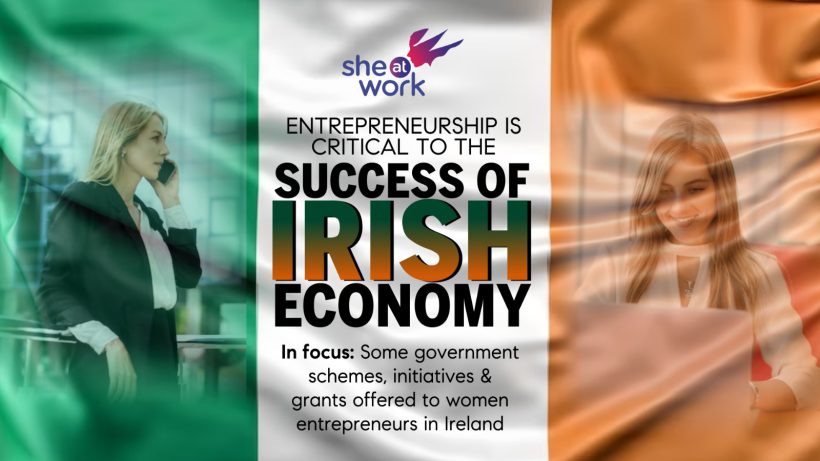In focus: Some government schemes, initiatives & grants offered to women entrepreneurs in Ireland
SMEs and entrepreneurship are central to Ireland’s challenge to generate growth & prosperity. In fact, entrepreneurs are critical to the success of the Irish economy. Entrepreneurship was defined in the 2014 National Policy Statement – as an individual’s creative capacity to identify an opportunity and pursue it in order to produce new value or economic success. The Policy Statement added that “entrepreneurship is a key element in the health and wellbeing of any thriving economy”.
Another noteworthy statistic is that the Global Entrepreneurship Monitor reports find that one in- five people in Ireland aspire to start a business – a fact that is very encouraging, as it suggests that a long line of entrepreneurs will emerge in the future. The aspiration for growth of early stage entrepreneurs in Ireland is ranked first across Europe and against competitor counties. Reflecting the relatively small size of the Irish market and the openness of the Irish economy, three in four early-stage entrepreneurs in Ireland expect to have international customers. Ireland ranks highest against competing countries in the proportion of early stage entrepreneurs that expect 25% to 75% of their revenues to come from customers, outside Ireland.
Here are some government schemes, initiatives & grants offered to women entrepreneurs in Ireland.
> The Department of Enterprise, Trade & Employment
The Department of Enterprise, Trade & Employment has a broad, comprehensive range of initiatives to encourage, support and develop women in leadership, both in business and female entrepreneurship. These include, for example, Women in Business Networks run by the Local Enterprise Offices, the Competitiveness Start-Up Fund and the Fuelling Ambition Programme, both run by Enterprise Ireland, the Female High Fliers Programme at the DCU Ryan Academy, the Going for Growth programme, the Acorns programme, which has a particular focus on female-led start-ups in rural areas.
Significantly, Enterprise Ireland’s Female Entrepreneurship Unit was established – to support ambitious women grow scalable businesses and to address the key challenges impacting on the growth of female led business opportunities. In fact, Enterprise Ireland’s website has a dedicated “Female Entrepreneurship” page where you can learn about their support for women entrepreneurs.
In January 2020, the Minister for Business, Enterprise and Innovation had launched Enterprise Ireland’s new ‘Women in Business Action Plan’ which set out 24 actions – to support the scaling of female led businesses, increase start-up rate among females, support recruitment of part- time senior managers by business and to highlight role models and good practice.
> Financing Programmes
Credit Guarantee Scheme (CGS)
Ireland’s Credit Guarantee Scheme was launched in October 2012 and provided a 75% guarantee to banks against losses on loans to eligible SMEs with a value ranging between EUR 10 000 and EUR 1 million. It thus aimed to facilitate lending to SMEs with a viable business model. SMEs making use of the CGS were requested to pay a maximum premium of 2% per annum to the Department of Business, Enterprise and Innovation (DBEI).
Comparisons with other CGSs around Europe indicate that the Irish scheme is modest in size and outreach. Ireland could conduct an evaluation of its revised credit guarantee scheme, and consider further additional revisions to increase the take-up.
Local Enterprise Office (LEO) grants
Local Enterprise Offices (LEOs) offers direct financial grants to micro-firms in the manufacturing and internationally traded services sectors. There are three main categories of grants under which direct financial assistance is provided:
- Feasibility Grants (investigating the potential of a business idea);
- Priming Grants (to part-fund a start-up);
- Business Development Grants for existing businesses that want to expand.
There is also a Technical Assistance Grant available for eligible micro-exporters, who are
seeking to explore alternative markets for their product or service.
Strategic Banking Corporation of Ireland (SBCI)
The SBCI, a state-owned bank, began operations in March 2015. It does not provide financing
directly to SMEs, but provides funding at relatively low rates to financial institutions that in turn
allocate funds to SMEs. It works with seven on-lending partners, three bank and four non-bank
institutions, and has a funding capacity of more than 1 EUR billion.
The SBCI launched the Brexit Loan Scheme together with the Department of Finance, DBEI and the Department of Agriculture, Food and the Marine at the end of March 2018. The scheme provides 1-3 year term loans of between EUR 25 000 and EUR 1.5 million to eligible enterprises, at a maximum interest rate of 4%. It is supported by EIB Group’s InnovFin SME Guarantee Facility.
A new Future Growth Loan Scheme announced in Budget 2019, jointly funded by the DBEI and the Department of Agriculture, Food and the Marine provides a longer-term scheme facility of up to EUR 300 million to support capital investment by business. This scheme includes the primary agriculture and seafood sectors.
Microenterprise Loan Fund Scheme
The Microenterprise Loan Fund, managed by Microfinance Ireland, was set up under the Action Plan for Jobs – to support economic development and to increase employment and enterprise. This is achieved through the provision of unsecured business loans of EUR 2 000 to EUR 25 000 for commercially viable proposals to micro-enterprises that cannot get funding through normal commercial channels (for working capital, equipment, start-up costs, or marketing purposes). The loan term is typically 3 years for working capital purposes and can be extended to 5 years for capital expenditures.
The more successful schemes in Europe appear to have a significant impact on entrepreneurship, economic growth and social inclusion. One crucial characteristic for success appears to be the availability of non-financial support such as – coaching and mentoring to their beneficiaries.
A key focus of the Fund is financially vulnerable sectors such as – the unemployed, females, older adults, youth and migrants. As of September 2018, 23% of loans were for beneficiaries of the “Back to Work Enterprise Allowance”, of which 26% were women and 19% non-Irish passport holders.
Development Capital Scheme
The Development Capital Scheme is designed to address the funding gap for mid-sized, high- growth, indigenous companies that have significant prospects for job and export growth. Through this scheme, Enterprise Ireland co-invests on a pari passu basis and with the same commercial terms as privately run and managed Funds, i.e. MML Capital Ireland, BDO Development Capital Fund and Cardinal Carlyle Ireland Fund. A total of EUR 225 million in funding is available, typically investing between EUR 2 to EUR 10 million in equity, quasi equity and/or debt.
Innovation Fund Ireland
The objective of Innovation Fund Ireland is to attract global venture capital firms and experienced investment managers to Ireland – to invest in innovative SMEs. It is managed by Enterprise Ireland and the Ireland Strategic Investment Fund (ISIF), which both invest EUR 125 million in the Fund. Approximately EUR 80 million has been committed to four funds which are actively investing and have completed their investment cycle. These funds are Sofinnova Ventures, Arch Venture Partners, Highland Capital Partners Europe and Lightstone Ventures.
Enterprise Ireland Seed and Venture Capital Scheme
The Seed and Venture Capital Scheme has been in operation since 1994. This was established to increase the availability of risk capital for SMEs. Since 1994 there have been four multi- annual programmes under the scheme.
The government, through Enterprise Ireland has made a further EUR 175 million available for a fifth multi-annual programme (2019-2024) – to stimulate job creation and support the funding requirements of young innovative Irish companies.
https://www.oecd-ilibrary.org/sites/4d49187c-
en/index.html?itemId=/content/component/4d49187c-en
> Going for Growth
Over the last decade, Ireland has been focusing on fostering female entrepreneurship – with striking results. A simple yet highly effective peer mentoring scheme – Going for Growth has helped participants grow their combined sales by 28 % in just six months.
Each country has to learn and network, but the real heart of the program is – the roundtable sessions. These monthly, three-hour groupings of aspiring and successful businesswomen are focused on business growth strategies and are very practical and results-driven. The groups are run by Lead Entrepreneurs, high-profile women with successful businesses.
Quite notable was the fact – that in 2014, more than twice as many men as women started a business in Ireland.
https://apolitical.co/solution-articles/en/ireland-became-hub-female-entrepreneurs










